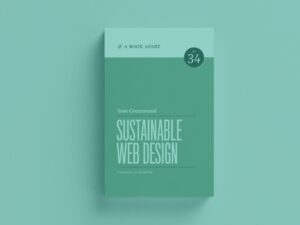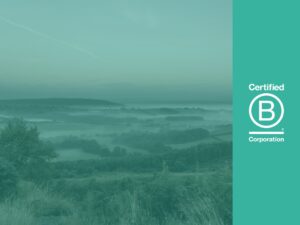
Blog
Kakadu Creative: Is it Right to Bring Your Ethics and Mission to the Forefront of Your Business?
31st May, 2023
Our recent B Corp certification got us thinking about all the other partners in our network who also try to use their business to do good. A prime example is Kakadu Creative, whose homepage states ‘Be Better. Be Different. Because “business as usual” just isn’t good enough anymore‘. We wanted to talk to them about why business as usual just doesn’t cut it in today’s world, and whether really focusing in on ethics and mission is what businesses should be doing.
Read on to discover Co-founder, Kayleigh’s, thoughts around business ethics, saying no to client work, and how clients respond to clearly stated principles.
“Doing right for people, planet and animals – why wouldn’t you? If you’ve got the power and the skills to do right and do good, why would you use them for anything else?”
Q: How far into Kakadu Creative’s journey did your ethics and mission become central to the business?
A: From day one it was central for us. Myself and Lee both come from a magazine publishing world where it was very much about the money and profit, and there was no focus on purpose – I was banging my head against the wall just trying to get a recycling system for the office! It wasn’t fulfilling, so we thought ‘let’s do our own thing’.
We wanted to set up an agency that put the customer first and did what was right for them, because if you do what’s right for the client they’ll come back, and they’ll refer you, so it’s a win, win.
The ethics of sustainability and veganism were core to the business from the start, but we kept them behind the scenes. Saying that now feels silly, but at the time it was a new business, we were conscious of overheads, and particularly with vegan ethics you worry that if you start talking about it you’re going to lose customers.
A couple of years later, the business was stable and we thought ‘we’re doing all of this stuff but it’s behind the scenes, is this really what we set out to do?’ Yes we were putting our clients first, but were we putting our ethics and morals out there? The answer was no.
We discussed whether promoting our ethics might mean we lost customers and future projects,, but if a client didn’t want to work with us because of our beliefs, were they the right client for us? The answer was no, and equally, were we the right agency for them? Also, no.
By bringing ethics to the forefront, we’re weeding out the wrong clients for us straight away. Plus, a positive result of talking about our ethics was finding ourselves in a position of influence. Current clients who didn’t know about our ethics and morals then started to have conversations with us on sustainability, animal agriculture, climate change etc and we helped them on their own sustainability and ethical journeys. It’s been incredibly rewarding, because we’re wearing our hearts on our sleeves, and we’re talking to people who are on that same mission as well as helping others to get started.
Q: Has being clear about your ethics in your marketing and comms helped potential clients to self screen themselves or are you having to turn down a lot of work that isn’t right for you?
A: Yes, we don’t get as many inquiries where we’ve had to say ‘this is not right for us’. We’ve had a few occasions where people have been in industries that don’t align with our beliefs, such as fish farming, so we had to politely say that we weren’t the right agency for them. But we get far fewer of those.
It’s interesting because there’s a train of thought that some people have put to us where they say, ‘if someone came to you and they were animal testers, and they had £1 million and wanted help with branding, marketing and their website would you not take that? Think of what you could do with that money, you could donate a huge chunk of that to animal charities’. I do get where they’re coming from, we could use that money for good, but at the same time that company won’t give us £1 million if they don’t think they’re going to get more than £1 million back. So yes, we could take that money and donate it to a charity, but we’ve still helped that company to do even more of the things that we don’t agree with.
Q: Why are ethics important to Kakadu Creative?
A: Big question! It’s just the right thing to do. A lot of people might say money and GDP is the most important thing, and the economy is king. But we feel that that mindset is one of the root causes of why we’re in the situation we’re in.
The constant pursuit of more, more, more has got us into this situation. In our minds, if you’ve got the power and the skills to do right and do good for people, planet and animals, why would you use them for anything else?
Q: What does it mean to be a ‘cruelty-free’ design agency?
A: We’ve had people say to us: ‘how can a design agency be cruelty free?’ because you straight away think of cruelty as making products using animals, or testing on animals. Obviously we don’t do that, but there are parts of our work that can have an impact on animals. For example, printing, bookbinding, and laminating can all use animal products in the inks, the glues, the lamination products etc. So, that’s a big area where we can be cruelty free and not use animal products.
The other part of being a cruelty free design agency is who we use our skills and expertise to support. For example, a few years ago we were contacted by a clothing manufacturer and we asked them about the materials they used and who they made clothing for. They were using wool and leather and they were supplying fast fashion brands, so they were two areas that didn’t align with our ethics and we declined their project.
Q: How do your clients respond to the importance of Kakadu Creative’s ethics and mission?
A: Positively! We’ve not had a single client leave or say they don’t like the fact we’re now talking about our ethics. In actual fact it’s been the opposite, and we’ve had really positive and empowering conversations with people.
I’ve been involved with Extinction Rebellion who can obviously be really polarising, which I totally get. At first I wasn’t confident about bringing that side of me out in my professional work, but I thought if I’m doing all of this in my personal life and not raising that awareness externally then I’m not doing it properly. There’s a photo of a policeman dragging me out of the road, and I just thought it was such a powerful picture so I put it on my LinkedIn and wrote about what we were doing and why we were there. To this day it’s one of my most popular and most interacted with posts on LinkedIn, and 99% of it was positive comments. I’ve just not seen any negatives from bringing our ethics to the front of the business.
Q: Is there ever a wrong time to bring your ethics and mission to the front of a business?
A: If you’re not genuine and it’s not true to who you are and what you do, people will see through it.
It’s the whole greenwashing thing isn’t it? You put out a message and if you’re not 100% in it, you will do something at some point that will undermine the ethical message. The trust from clients and your credibility will go and people are then less likely to want to work with you.
When we first thought about making our ethics more visible we spoke to a marketing consultant for advice, and in that first conversation they said don’t do it because it could be quite polarising, and you’ll lose business. But as we continued speaking they said actually, yes, you do need to talk about your ethics because it is a core part of who you are. You’re not just saying it to tick a box, it’s genuine.
There can be a lot of pressure to bring ethics and morals into your business because more and more people are now looking to spend their money in ethical ways. Meaning it can be really tempting for a company to put ethical messages out there just to attract customers.
That’s not to say don’t do it! Just do it in a way that is true to you and your business. Don’t suddenly come out and say you’re a vegan business if you’re not. Don’t say you’re sustainable because you installed a paper recycling programme in your manufacturing plant which creates tonnes of waste each year because it will undermine your credibility.
If you are really conscious that you want to take steps to build a better world, do the bits that are true to you. Think about what you actually care about and bring those ethics into your business. For us the key things are animal rights, sustainability, climate change, the environment and nature. They’re the really core things but for other companies it may be children and supporting children’s charities. There might be a particular disease that you’re really focused on, use that as part of your ethical messaging.
Q: Working in marketing, how important do you think it is to tackle the elephant in the room of digital sustainability? How does Kakadu Creative approach this, and sustainable marketing practices in general?
A: Incredibly important. I’ve been doing talks about digital sustainability and the digital carbon footprint for a few years, largely because it was something that I had no idea about and I know there are lot’s out there who still don’t!
When I realised the impact the internet has on the environment and the fact that it’s more polluting than the aviation industry it just blew my mind. There are lots of conversations about how damaging the transport industry is with things like the ‘no fly’ pledge but how many people say I’m going to have a ’no internet’ pledge? Would it even be feasible in today’s society? We use this technology indiscriminately, all day everyday so it’s really important to get that message out there because if we don’t talk about it, people don’t know, and the problem gets worse.
Sustainable marketing is key to changing the consumer narrative. We’ve had generations of marketers being all about ‘buy, buy, buy’ and we’ve been in a position of power historically where we’ve shaped the messaging around needing more things to be happy and successful.
Now we’re in a position where we can change that conversation and tell people to buy because a product is sustainable, longer lasting, recycled etc, we’ve got the power to start to change what people see as important when they’re making those buying decisions and even influence them into not making a purchase if that’s the right thing to do.
Q: Do you have any recommendations for support/resources that business owners can access to help them implement their ethics?
A: For me personally, it’s been talking to people and building a network. One thing that can feel hard when leading with ethics is feeling alone with it. However, the more people I’ve connected with, and the more people I’ve found working in sustainability and ethical spaces, the more empowered and reassured I’ve felt. There are lots of people out there, trying to fix this and by working together we have a real chance at building a brighter, fairer, healthier and more sustainable world for all of us.
So, if anyone is reading this and wants to connect to talk all things ethical business, feel free to find me on LinkedIn.






